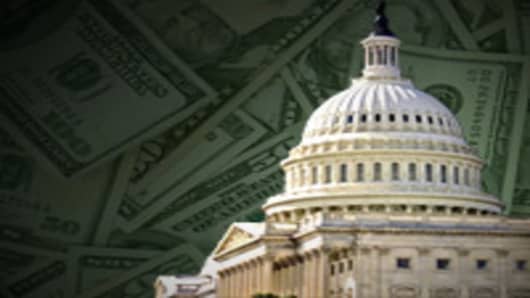New figures out from the Congressional Budget Office indicate that this year's budget deficit will be a colossal $1.5 trillion.
It's sometimes easy to become numb to huge numbers.
(After all: A half trillion dollar deficit sounds enormous as well.)
But let's put that number in perspective: Based on that figure, the federal government will be borrowing 40 cents on every dollar it spends.
Now, while it's always dangerous to compare the finances of nation states to individuals—the scenarios are clearly not parallel construction—the 40 percent figure does put things into some perspective for ordinary Americans. (If you earn $50,000 a year—and you're spending $70,000 —you're going to be in for a serious day reckoning.)
As for the causes of the staggering deficit, they are probably what you would expect: A weak economy coupled with reduced tax revenue from rate cuts without growth.
The magnitude of the deficit will likely only intensify the ongoing political rancor. From the AP article cited above:
"The new Congressional Budget Office estimates will add fuel to a raging debate over cutting spending and looming legislation that's required to allow the government to borrow more money as the national debt nears the $14.3 trillion cap set by law. Republicans controlling the House say there's no way they'll raise the limit without significant cuts in spending, starting with a government funding bill that will advance next month."
And with flat economic growth—and stagnant employment rates—this isn't a problem we're going to grow our way out of anytime soon.
"The CBO analysis predicts the economy will grow by 3.1 percent this year, but that joblessness will remain above 9 percent this year. Dauntingly for President Obama, the nonpartisan agency estimates a nationwide unemployment rate of 8.2 percent on Election Day in 2012."
Finally, based on the current structure of our federal spending—and the third-rail politics of benefit reductions—cost cutting our way out the deficits is likely a political non-starter:
"The chilling figures come the morning after Obama called for a five-year freeze on domestic agency budgets passed by Congress each year. But those nondefense programs make up just 18 percent of the $3.7 trillion budget, which means any upcoming deficit reduction package—at least one that begins to significantly slow the gush of red ink—will require politically dangerous curbs to popular benefit programs, which include Social Security, Medicare, the Medicaid health care program for the poor and disabled, and food stamps."
In summary, the CBO reports strikes a sober note: "The United States faces daunting economic and budgetary challenges. The economy has struggled to recover from the recent recession, which was triggered by a large decline in house prices and a financial crisis - events unlike anything this country has seen since the Great Depression."
Whenever a government report marches out the Great Depression as a metaphor the political waters ahead are likely to be choppy.
_____________________________________________________
Questions? Comments? Email us atNetNet@cnbc.com
Follow NetNet on Twitter @ twitter.com/CNBCnetnet
Facebook us @ www.facebook.com/NetNetCNBC


